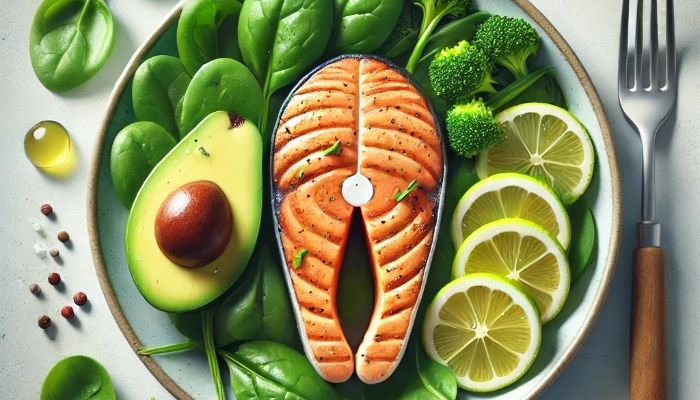Over the past few years, a diet has been making its way in the fitness world called keto or ketogenic. The Keto diet turns this tradition on its head by severely limiting the intake of carbohydrates and replacing it with fat, which forces the body to begin using fat as a primary source fuel and can lead to a state called ketosis.
They may be beneficial for weight loss, brain function, and blood sugar control. Yet, with any diet, there are always pros and cons.
This blog will break down everything a beginner needs to know about the keto diet.
What is the Keto Diet?
Definition: The keto diet is a high-fat, low-carbohydrate diet that encourages the body to burn fat instead of carbs.
Parameters
- Carbohydrate intake: Carbs are usually limited to 20-50 grams per day.
- Fat: 70-80% of calories per day.
- Protein intake: Rest of the daily calories (10-20%)
How it works
This diet involves reducing carbohydrates to as low as 50g per day, which can deplete glycogen stores and get the liver to make ketones out of your lipid molecules (fatty acids). These ketones are what is used as the fuel source instead.
Effects of the Keto Diet Weight Loss:
The keto diet can be beneficial because in short-lived scenarios it puts your body into ketosis (water loss and fat burning).
- Improved Mental Clarity: The brain has a constant supply of ketones, which indicates better focus and concentration for some.
- Improved Blood Sugar Control: The ketogenic diet may be a good strategy for improving glucose management and treating patients with type II diabetes.
- Reduced Appetite: Ketosis reduces appetite, which helps you stay on the keto diet and consume less food in general.
May Improve Certain Health. - Conditions: The keto diet may offer benefits for several health conditions, including heart disease risk factors like high HDL cholesterol levels and inflammation.
Disadvantages of the Keto Diet Nutrient Deficiencies
Because the keto diet is very restrictive, it can be a source that causes nutrient deficiencies such as fiber, vitamins, and minerals.
- Keto Flu: People often feel bad in the first few days, then ad libitum complaining of headaches, fatigue, and irritability (answer as if they were sick!).
- Digestive Issues: The absence of fiber from the diet causes constipation and other digestive issues.
- Social Challenges: A highly restrictive diet such as the keto can be difficult to uphold in a social context, making it hard for you to eat out or share a meal with friends.
- Long-term Sustainability: Continuing with the keto diet is difficult, and its long-term effects are not studied much.
Who is the Keto Diet Good For?
- Weight Loss: People who are trying to lose weight will see a very rapid and effective result using the keto diet, paired with some exercise.
- Individuals with Type 2 Diabetes: The keto diet can help reduce blood sugar and insulin demand in persons suffering from the disease.
- Epilepsy: The keto first came into prominence as a treatment for epilepsy in children, and there is evidence that this type of diet can be therapeutic for people with the condition.
People with Insulin. - Resistance: The keto diet reduces insulin levels and improves glucose control in individuals that are demonstrating early stages of insulin resistance, which can be able to help fight off metabolic diseases.
Why?
Athletes Seeking Endurance – some endurance athletes turn to the keto diet as a way of improving performance by training their bodies to use fat for fuel.
When Should You Not Follow The Ketogenic Diet?
- Kidney Disease Patients: Keto diet is high in protein, which can put extra stress on the kidneys from processing also for individuals with kidney conditions.
- People With a History of Eating Disorders: The restrictive nature of the keto diet could potentially spark disordered eating patterns in those who struggle with anorexia/bulimia- or binge-eating tendencies.
- Pregnant women or breastfeeding mothers: The possible deficiencies of nutrient intake can be harmful for pregnant and breastfeeding women so it is better to stay away from this diet program if you are in one.
Some Medical Conditions
If you have liver disease, pancreatitis or gallbladder problems and are considering the keto diet it is advised not to pursue this as your overall fat consumption will likely compromise these. If you follow a diet tailored to attain balanced nutrition, the keto diet could be overly restrictive for your taste.
- Keto Diet Success Tips Ease Into It: Give it time — cut back on carbs several weeks before officially starting the diet so that your body can better adjust to being in ketosis.
- Meal Planning: This is definitely necessary to eat right and remain within your carb consumption.
- Hydration: Make sure you keep hydrated as best you can for the keto flu prevention.
- Know Your Macros: Understand the macronutrients around fats, proteins, and carbs that are levels as well.
- Test and Adjust: See how you feel, test your nutrient levels each month or less (do not wait until 3-6 months later), then adjust as needed.
Conclusion
The keto diet can provide a lot of benefits including weight loss, mental clarity, and blood sugar regulation. Yet this comes with both challenges and risks. You can also discuss with a physician whether the keto diet would be something worthwhile for you. If you do decide to move forward, then using these tips will keep you on the course and in balance while doing keto.
References








